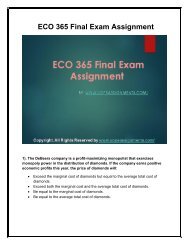QNT 561 Week 2 Weekly Learning Assessments - Assignment
QNT 561 Week 2 Weekly Learning Assessments - Score more in the weakly learning assignments by getting instant professional help from our learned experts.
QNT 561 Week 2 Weekly Learning Assessments - Score more in the weakly learning assignments by getting instant professional help from our learned experts.
You also want an ePaper? Increase the reach of your titles
YUMPU automatically turns print PDFs into web optimized ePapers that Google loves.
<strong>QNT</strong> <strong>561</strong> <strong>Week</strong> 2 <strong>Week</strong>ly <strong>Learning</strong><br />
<strong>Assessments</strong> – <strong>Assignment</strong><br />
Chapter 5 Exercise 4<br />
A large company must hire a new president. The Board of Directors prepares a list of<br />
five candidates, all of whom are equally qualified. Two of these candidates are members<br />
of a minority group. To avoid bias in the selection of the candidate, the company<br />
decides to select the president by lottery.<br />
a. What is the probability one of the minority candidates is hired? (Round your answer<br />
to 1 decimal place.)
. Which concept of probability did you use to make this estimate?<br />
Chapter 5 Exercise 14<br />
The chair of the board of directors says, "There is a 50% chance this company will earn a<br />
profit, a 30% chance it will break even, and a 20% chance it will lose money next<br />
quarter."<br />
a. Use an addition rule to find the probability the company will not lose money next<br />
quarter. (Round your answer to 2 decimal places.)<br />
b. Use the complement rule to find the probability it will not lose money next quarter.<br />
(Round your answer to 2 decimal places.)<br />
Find the <strong>Week</strong>ly <strong>Learning</strong> Assessment answers here <strong>QNT</strong> <strong>561</strong> <strong>Week</strong> 2 <strong>Week</strong>ly <strong>Learning</strong><br />
<strong>Assessments</strong><br />
Chapter 5 Exercise 22<br />
A National Park Service survey of visitors to the Rocky Mountain region revealed that<br />
50% visit Yellowstone Park, 40% visit the Tetons, and 35% visit both.<br />
a. What is the probability a vacationer will visit at least one of these attractions? (Round<br />
your answer to 2 decimal places.)<br />
b. What is the probability .35 called?<br />
c. Are the events mutually exclusive?<br />
Chapter 5 Exercise 34<br />
P(A1) = .20, P(A2) = .40, and P(A3) = .40. P(B1|A1) = .25. P(B1|A2) = .05, and P(B1|A3) =<br />
.10.<br />
Use Bayes' theorem to determine P(A3|B1). (Round your answer to 4 decimal places.)
Want to download the Complete <strong>Week</strong>ly <strong>Assignment</strong> of <strong>QNT</strong>/<strong>561</strong> Class..?? Click <strong>QNT</strong><br />
<strong>561</strong> <strong>Week</strong>ly <strong>Learning</strong> <strong>Assessments</strong><br />
Chapter 5 Exercise 40<br />
Solve the following:<br />
a. 20! 17!<br />
b. 9P3<br />
c. 7C2<br />
Chapter 6 Exercise 4<br />
Which of these variables are discrete and which are continuous random variables?<br />
a. The number of new accounts established by a salesperson in a year.<br />
b. The time between customer arrivals to a bank ATM.<br />
c. The number of customers in Big Nick’s barber shop.<br />
d. The amount of fuel in your car’s gas tank.<br />
e. The number of minorities on a jury.<br />
f. The outside temperature today.<br />
Chapter 6 Exercise 14<br />
The U.S. Postal Service reports 95% of first-class mail within the same city is delivered<br />
within 2 days of the time of mailing. Six letters are randomly sent to different locations.<br />
a. What is the probability that all six arrive within 2 days? (Round your answer to 4<br />
decimal places.)<br />
b. What is the probability that exactly five arrive within 2 days? (Round your answer to<br />
4 decimal places.)<br />
c. Find the mean number of letters that will arrive within 2 days. (Round your answer to<br />
1 decimal place.)
d-1. Compute the variance of the number that will arrive within 2 days. (Round your<br />
answer to 3 decimal places.)<br />
d-2. Compute the standard deviation of the number that will arrive within 2 days.<br />
(Round your answer to 4 decimal places.)<br />
Click here to download Complete Class of <strong>QNT</strong> <strong>561</strong><br />
Chapter 6 Exercise 20<br />
In a binomial distribution, n = 12 and π = .60.<br />
a. Find the probability for x = 5? (Round your answer to 3 decimal places.)<br />
b. Find the probability for x ≤ 5? (Round your answer to 3 decimal places.)<br />
c. Find the probability for x ≥ 6? (Round your answer to 3 decimal places.)<br />
Chapter 6 Exercise 26<br />
A population consists of 15 items, 10 of which are acceptable.<br />
In a sample of four items, what is the probability that exactly three are acceptable?<br />
Assume the samples are drawn without replacement. (Round your answer to 4 decimal<br />
places.)<br />
Chapter 7 Exercise 4<br />
According to the Insurance Institute of America, a family of four spends between $400<br />
and $3,800 per year on all types of insurance. Suppose the money spent is uniformly<br />
distributed between these amounts.<br />
a. What is the mean amount spent on insurance?<br />
b. What is the standard deviation of the amount spent? (Round your answer to 2<br />
decimal places.)<br />
c. If we select a family at random, what is the probability they spend less than $2,000<br />
per year on insurance per year? (Round your answer to 4 decimal places.)
d. What is the probability a family spends more than $3,000 per year? (Round your<br />
answer to 4 decimal places.)<br />
Click here and download <strong>QNT</strong> <strong>561</strong> <strong>Week</strong> 3 <strong>Week</strong>ly <strong>Learning</strong> <strong>Assessments</strong><br />
Chapter 7 Exercise 10<br />
The mean of a normal probability distribution is 60; the standard deviation is 5. (Round<br />
your answers to 2 decimal places.)<br />
a. About what percent of the observations lie between 55 and 65?<br />
b. About what percent of the observations lie between 50 and 70?<br />
c. About what percent of the observations lie between 45 and 75?<br />
Chapter 7 Exercise 14<br />
A normal population has a mean of 12.2 and a standard deviation of 2.5.<br />
a. Compute the z value associated with 14.3. (Round your answer to 2 decimal places.)<br />
b. What proportion of the population is between 12.2 and 14.3? (Round your answer to<br />
4 decimal places.)<br />
c. What proportion of the population is less than 10.0? (Round your answer to 4 decimal<br />
places.)<br />
Chapter 7 Exercise 18<br />
A normal population has a mean of 80.0 and a standard deviation of 14.0.<br />
a. Compute the probability of a value between 75.0 and 90.0. (Round intermediate<br />
calculations to 2 decimal places. Round final answer to 4 decimal places.)<br />
b. Compute the probability of a value of 75.0 or less. (Round intermediate calculations<br />
to 2 decimal places. Round final answer to 4 decimal places.)<br />
c. Compute the probability of a value between 55.0 and 70.0. (Round intermediate<br />
calculations to 2 decimal places. Round final answer to 4 decimal places.)
Complete <strong>Learning</strong> Assessment Answers just a click away <strong>QNT</strong> <strong>561</strong> <strong>Week</strong> 2 <strong>Week</strong>ly<br />
<strong>Learning</strong> <strong>Assessments</strong><br />
Chapter 7 Exercise 28<br />
For the most recent year available, the mean annual cost to attend a private university<br />
in the United States was $26,889. Assume the distribution of annual costs follows the<br />
normal probability distribution and the standard deviation is $4,500.<br />
Ninety-five percent of all students at private universities pay less than what amount?<br />
(Round z value to 2 decimal places and your final answer to the nearest whole number.)<br />
About Author<br />
This article covers the topic for the University of Phoenix <strong>QNT</strong> <strong>561</strong> <strong>Week</strong> 2 <strong>Week</strong>ly<br />
<strong>Learning</strong> <strong>Assessments</strong>. The author is working in the field of education from last 5<br />
years. This article covers the weekly learning assessment of <strong>QNT</strong> <strong>561</strong> <strong>Week</strong> 2 from<br />
UOP. Other topics in the class are as follows:<br />
<strong>QNT</strong> <strong>561</strong> <strong>Week</strong> 3 <strong>Week</strong>ly <strong>Learning</strong> <strong>Assessments</strong><br />
<strong>QNT</strong> <strong>561</strong> <strong>Week</strong> 4 <strong>Week</strong>ly <strong>Learning</strong> <strong>Assessments</strong><br />
<strong>QNT</strong> <strong>561</strong> <strong>Week</strong> 5 <strong>Week</strong>ly <strong>Learning</strong> <strong>Assessments</strong><br />
<strong>QNT</strong> <strong>561</strong> <strong>Week</strong> 6 <strong>Week</strong>ly <strong>Learning</strong> <strong>Assessments</strong><br />
Want to check other classes..?? Visit www.uopstudents.com.





